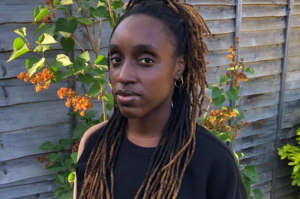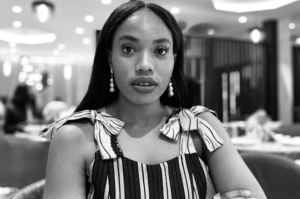It all started with an itch.
A damn itch.
It had crept up on you from nowhere, and lodged on your butt, teasing, kneading, and sending sweet torment through you. It soon slid into your asshole. And gnawed.
You were at a bus park in Ibadan. People everywhere. Loud music. Blaring car horns. You hurried to the back of a depleted bus. The ground there was soggy and stunk of urine. But you were past caring. You unbuckled your trousers, pulled them down, and raised your singlet to expose your boxer shorts. And you did the needful. Eyes shut, lips twitching, your hand worked in andout, up and down. Quelling the fire.
It was after you were done with your business and turned to go that you saw her, standing a few feet away and clutching a handbag; watching you.
Shock coursed through you and the shame soon drove you out of there.
***
Later, to your dismay, you saw her standing by a seat as you and other passengers filed into Jolly Coach.
“Please, is this Seat 25?” You heard her ask a passenger who was struggling to push his bag into the compartment above his seat.
“Yes, that’s it,” the man said.
You checked your ticket. Seat 26.
***
An hour into the journey andyou both had not said a word to each other. You stole quick glances at her, hoping not to be caught.She sat with her head on the headrest; eyes shut. Sleeping, you presumed. Your phone beeped; a message.You were reaching for your pocket when the bus jumped into a pothole.
Shouts of ‘Blood of Jesus,’ rent the air.
“Driver, easy o!” someone said.
You checked your phone and saw the message. “Text Gobe…” You hissed and put the phone back.
“All these drivers,” you heard her say. “Endangering our lives anyhow.” You weren’t sure if it was an invitation, so you kept quiet, and listened while she talked.
“I don’t blame the driver,” someone said from behind. “It’s the government I blame for the bad roads.”
“We always blame the government,” she countered. “Didn’t the driver see the pothole? I bet if it was me at the steering, I would have done better.”
You smiled at this: a woman at the steering wheel. You liked when women thought of things only men thought they could do.
“I agree,” you said to her.
She looked you over, as though seeing you for the first time, and smiled. “What is it you agree on?”
“That you would do better at the steering,” you said.
She laughed. A warm, ear-pleasing laughter.
“And it’s not flattery,” you said.
“Ah, I know it is not. You sound truthful.”
“Me?”
“Yes.”
“How does one sound truthful?” You wanted to know.
“Well, there is always firmness with truth. Certainty, if you like. Your voice has that.”
You smiled. “Thank you. And sorry about what happened back there.”
She sat up and turned to you. “Back where?”
“Back at…you know…the park.”
“I don’t get you.”
“I…well; you know…what happened at the park.”
“What happened at the park?”
You stared at her, feeling like a fool. Had she not want you to bring up the topic? Or was she the wrong lady?
“Go on,” she urged.
“I…I am sorry. I think I mistook you for someone else,” you said.
“Oh.”
“Very sorry.”
“It’s alright,” she said. “This sort of thing happens a lot.”
“What sort of thing?”
“This…you know, people mistaking people for other people. It happens a lot.” She was smiling now.
“Yeah…you’re right.” You smiled back. “Thank you.”
“Ahn-ahn, why are you thanking me?”
“For understanding,” you said. “Thank you for understanding.”
She chuckled. “Thank you too.”
And at this, you both laughed.
***
She told you her name. Chidera.
“Oh, so that’s what it means?” you said after she had explained its meaning to you.
“Yes. Whatever God has written cannot be changed.”
“Beautiful name.”
“Thank you. So you live in Lagos?”
“Yes I do.How about you?”
“Lagos too. I went to see an aunt of mine and her family in Ibadan. I go there thrice a year.”
“That’s nice,” you said.
“And you?” she asked. “Who did you go to see in Ibadan?”
“My parents. I was missing them a lot, so I thought I should go and pay them a visit.”
“Hmmm. Quite thoughtful of you.You know, young people nowadays hardly give a hoot about old folks. It’s like we are all just busy…too busy.”
“True. True.”
“I am sure your visit must have meant a lot to your parents.”
“Well…I really hope it did.”
“Don’t worry,” she said, smiling. “I am positive it did. So you are…a student?”
“Student? Do I look that young?” You asked in mock alarm.
“How would I know?” She laughed. “You never can tell. So tell me: Are you a student?”
“No ma,” you said in mock sarcasm. “I work actually. I am a chartered accountant.”
“Oh. Money man. I hope you haven’t been reeling off figures in your head all the while?”
You laughed. “No o. So what about you? You look like a student to me though.”
“Was a student.”
“Was?”
“Yeah. Couldn’t continue. Money matters and stuff like that.”
“I see…”
“But I have not stopped learning o. Even though I’m not your quintessential student, I still learn. Like now, I am learning about you.”
You smiled and shook your head. “But would you continue your schooling if there was a chance? I mean, with less money matters?”
“Of course, why not? If an opportunity presents itself, I will.”
“That’s good. Don’t worry, an opportunity will come.” For her sake, you hoped it would. She nodded, as though sharing in your belief.There was a brief pause. You feared she would relapse back into the silence.
“Hey, have you seen the video of an American cop shooting and killing a black man in Philadelphia?”
“No,” she said. “But I have heard about it. Quite distasteful, if you ask me.”
“A big shame,” you said.“And I used to think the days of white-on-black werefar behind us.”
“Ha! You wish. It has been here all the while. Our world is pretty messed up.”
“Sad. That was how I saw another video of a cop shooting at a running black boy. I think I have ithere in my phone. Come and see—”
“No, thank you. I can’t watch it.”
“Why?”
There was a pause. She smiled, shook her head and said, “You won’t believe if I told you.”
“Try me,” you said.
***
You would never forget the day you took Chidera to see your parents. You had waited until it was late in the night, when you were sure she would be fast asleep, before you broke the news to them. Before then, Maami had badgered you with questions: Who is she? What is her name? Is she your friend? Is she blind? What is she doing here with you? You told her to be patient, that you would answer all her questions in due time.
It was Maami who first broke loose from the silence that seized the room when you told Baami and her of your intentions. She leapt to her feet and, shaking her head, screamed, “No, no… No way will I allow you bring shame to this family.” You told her to calm down, so as not to awake your visitor, their visitor. And to this, she replied: “To hell with you and your visitor!”
Baami, after he had fought off the silence on his tongue, asked what was wrong with you. He asked if you had not seen better girls in Lagos, girls who, he said, were better than the one you had brought home. He said he was disappointed with you.
After you had let their caustic words sink in, you told them both that you had seen other girls, that in fact you had seen them in their numbers, each willing to let you have them on a platter of gold, but that it wasn’t them you loved. That it was Chidera you loved.
“Do you hear him?” Maami asked Baami, pointing at you; her voice quavered. “Do you hear the rubbish he is vomiting?”
Baami shook his head and said, “I am disappointed.”
***
Chidera’s parents gave you better reception. Her father grabbed your hand with both of his as though he were receiving a presidential handshake; her mother sang and danced and called on her neighbours, friends and enemies to come and see you; you, she said, the hand that had been sent by God to wipe away her tears. You felt like a prized possession; a valuable they never believed they would have.
“I know you are hungry,” her mother said as they ushered you through the dark corridor and into their home. “Let me go and prepare something for you.” You wanted to tell her not to bother, that you had eaten before coming, but she had gone off in a rush with her daughter before you had a chance.
“I have heard so many good things about you.” That was her father. He was smiling at you.
You smiled back. “I’m glad to hear that sir.”
“You are a good man,” he said.“Not many would do what you are doing. I’m a man like you, I know how hard this decision you are taking is.”
“Thank you sir, I—”
“Hope you eat ofe nsala?” Her mother poked her head in through the door.
“Of course I do, ma,” you said.
“Ah.” Her face brightened. She redrew her head and you imagined her racing back to the kitchen, the kitchen that her daughter had told you was at the back of the compound, side-by-side with the pit latrine.
You reined in your repulsion.
Sacrifice. Was that not what love was about?
***
No. Love wasn’t all about sacrifices, a part of your heart would later tell you. It was about compromise: making your parents happy by heeding their warnings, saving face so that friends do not pester and ask embarrassing questions and recoil from you, smothering your feelings and leaving in you a gaping wound. That, that half of your heart told you, was love: love for self.
But the other half reminded you of Chidera. Of your feelings for her. Of what her absence would do to you for life.
You sighed.
And began dialing the wedding planner’s number. There would be no wedding.
**************
Post image by Monsieur et Madame by Ibrahima Kébé via Manufactoriel
About the Author:
Uzoma Ihejirika participated in the 2015 Writivism Creative Writing Workshop in Lagos and his short fictions have appeared in Kalahari Review, Deyu African, and other numerous platforms.











Chiderra April 04, 2021 07:14
Sad. Moving. Compelling. Timeless.